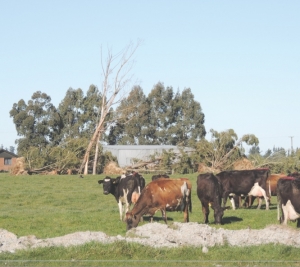Some are already counting the cost of lost production while others are hoping regular rain will keep the grass growing until the irrigation infrastructure can be repaired.
By the end of the week it was expected all sheds would be back on mains power as lines companies reconnected the last few rural properties. Immediately after the September 10-11 gales they were counting the outages in tens of thousands, including hundreds of dairy sheds.
For those with generators, little if any production was lost as there was minimal disruption to milking but for some without it took up to three days to source a temporary power supply.
“All the cows were milked by the Friday,” Federated Farmers Dairy chairman Willy Leferink, who farms in the heart of the stormstruck area, told Dairy News.
“If they weren’t, it’s because there were personal issues because there were plenty of generators available.”
For those that missed several milkings there will inevitably be an effect on production and he believes all farms should bite the bullet and buy a generator now.
“With an $8 payout forecast, it is the year to buy it.”
Compared to the multi-million turnover of most farms these days, the $10,000 to $20,000 price tag is a modest investment.
“Quite a few [shed] builders insist on including them these days anyway. All our farms bar two had generators, and one of those which didn’t have one was only because we hadn’t got round to picking it up yet.”
A few milk collections were missed due to roads blocked by trees and/or powerlines but little if any milk had to be spilt, he says.
Some milk couldn’t be chilled properly, which normally would have incurred penalties, but as far as he was aware processors had been reasonable in making allowance for the exceptional circumstances.
Stock water was also a problem for those without power, with many having to tanker water in.
While all sheds were up and running within days of the storm, it is another story with the irrigators, relied on by many dairy farms in Canterbury to keep the grass growing. An estimated 800 pivots, laterals and/or rotor-rainers were blown over by the nor’west blast that touched 143km/h at Christchurch Airport.
“The shortage of [irrigator] parts is going to be an issue,” says Leferink. “They’ve flown in a lot of teams of people but there are some parts, like lengths of pipe, you can’t fly in.”
Some farms on lighter soils were already irrigating, so infrastructure damage seems already likely to cause production loss for some.
That said, Leferink says he’s heard quite a few of the damaged pivots can be made operational, just without the corner arms which seemed the parts most prone to damage.















